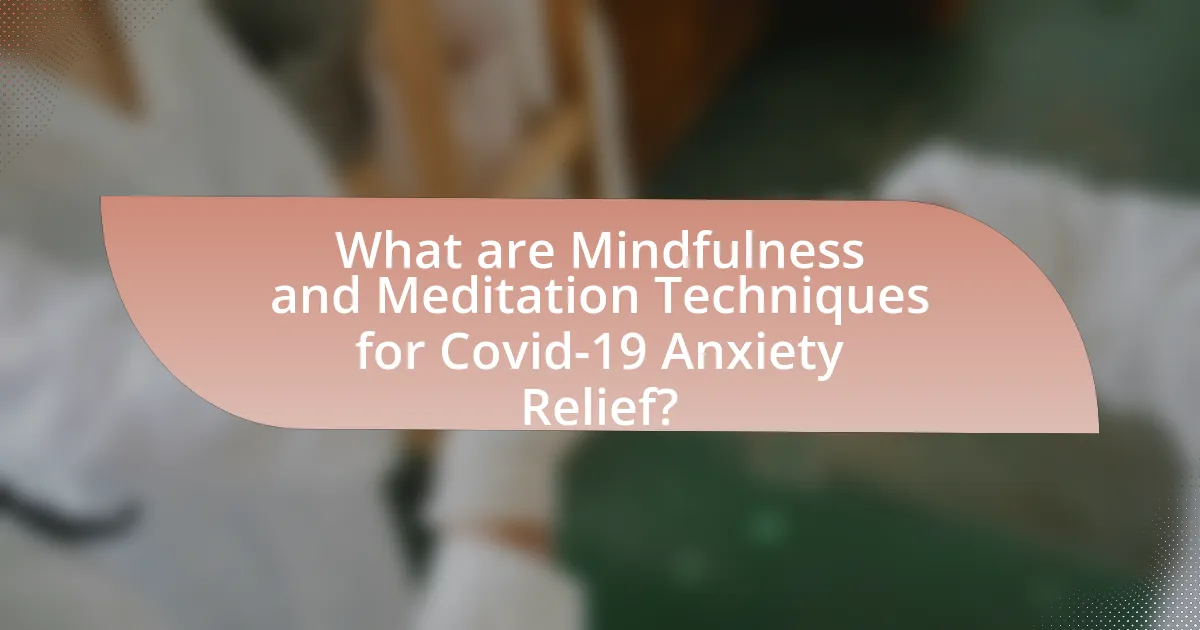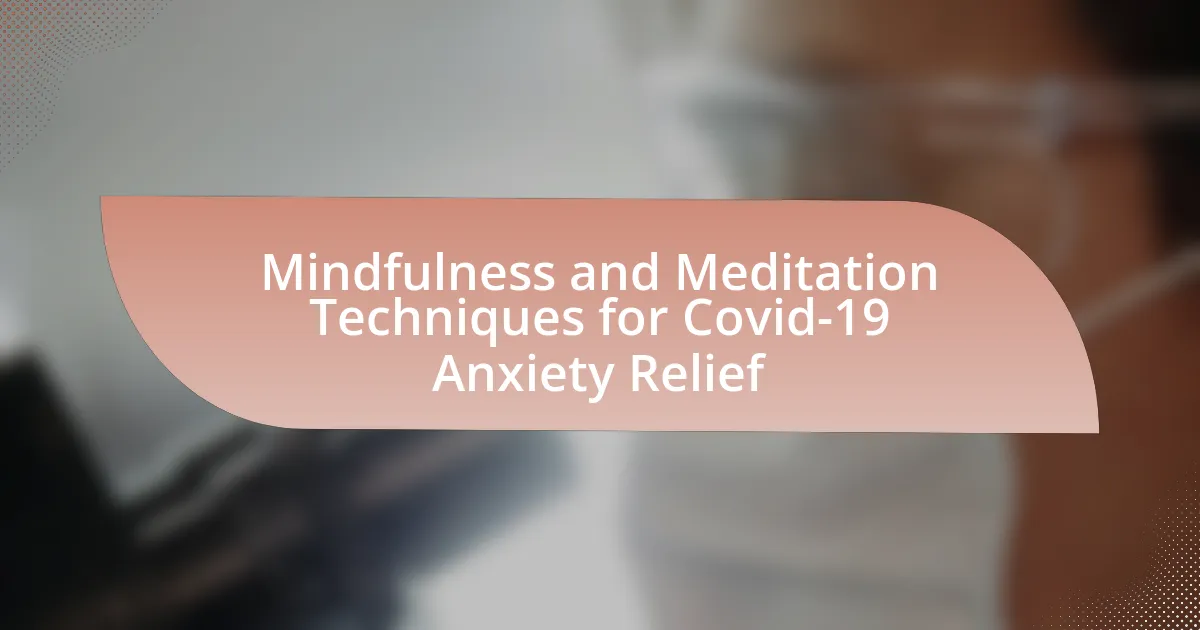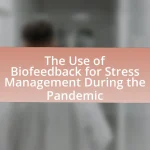Mindfulness and meditation techniques are effective tools for alleviating anxiety related to the Covid-19 pandemic. Key practices include focused breathing, body scans, and guided imagery, all of which have been shown to reduce stress and promote relaxation. Scientific research supports the efficacy of these techniques, demonstrating significant reductions in anxiety levels and improvements in emotional regulation. The article explores specific mindfulness practices, their benefits, and practical tips for incorporating them into daily routines, highlighting the importance of community support and consistency in enhancing mental well-being during challenging times.

What are Mindfulness and Meditation Techniques for Covid-19 Anxiety Relief?
Mindfulness and meditation techniques for Covid-19 anxiety relief include practices such as focused breathing, body scans, and guided imagery. Focused breathing involves taking deep, slow breaths to calm the mind and reduce stress, which has been shown to lower anxiety levels (Kabat-Zinn, 1990). Body scans encourage individuals to mentally check in with different parts of their body, promoting relaxation and awareness of physical sensations, which can help alleviate tension (Kabat-Zinn, 1990). Guided imagery involves visualizing peaceful scenes or experiences, which can distract from anxiety and foster a sense of calm (Miller et al., 2014). These techniques have been supported by research indicating their effectiveness in reducing anxiety symptoms during stressful times, such as the Covid-19 pandemic.
How do mindfulness and meditation help alleviate anxiety during the pandemic?
Mindfulness and meditation help alleviate anxiety during the pandemic by promoting relaxation and reducing stress responses. These practices encourage individuals to focus on the present moment, which can diminish feelings of worry about the future or regret about the past, both of which are common triggers for anxiety. Research indicates that mindfulness-based interventions can lead to significant reductions in anxiety levels; for instance, a study published in the journal “JAMA Internal Medicine” found that mindfulness meditation programs can improve anxiety, depression, and pain. Furthermore, regular meditation has been shown to alter brain activity in areas associated with emotional regulation, enhancing resilience against stressors related to the pandemic.
What scientific evidence supports the effectiveness of these techniques?
Scientific evidence supporting the effectiveness of mindfulness and meditation techniques for anxiety relief during the Covid-19 pandemic includes multiple studies demonstrating significant reductions in anxiety levels among participants. For instance, a meta-analysis published in the journal “Psychological Bulletin” by Khoury et al. (2015) found that mindfulness-based interventions significantly reduced anxiety, with effect sizes indicating moderate to large benefits. Additionally, a study conducted by Goyal et al. (2014) in “JAMA Internal Medicine” reported that mindfulness meditation programs improved anxiety, depression, and pain, highlighting their relevance during stressful periods like the Covid-19 pandemic. These findings collectively affirm the efficacy of mindfulness and meditation techniques in alleviating anxiety.
How do mindfulness and meditation impact mental health during stressful times?
Mindfulness and meditation significantly improve mental health during stressful times by reducing anxiety and enhancing emotional regulation. Research indicates that these practices activate the brain’s relaxation response, leading to decreased levels of cortisol, the stress hormone. A study published in JAMA Internal Medicine found that mindfulness meditation programs can lead to moderate improvements in anxiety, depression, and pain, demonstrating their effectiveness in managing stress-related symptoms. Furthermore, mindfulness enhances self-awareness and promotes a sense of calm, which can be particularly beneficial during crises like the Covid-19 pandemic.
What specific mindfulness techniques can be used for anxiety relief?
Specific mindfulness techniques for anxiety relief include deep breathing exercises, body scan meditation, and mindful observation. Deep breathing exercises involve focusing on slow, deep breaths to activate the body’s relaxation response, which can significantly reduce anxiety levels. Body scan meditation encourages individuals to mentally scan their bodies for tension, promoting awareness and relaxation of each body part, thereby alleviating anxiety. Mindful observation involves paying attention to the present moment without judgment, which can help individuals detach from anxious thoughts and feelings. Research indicates that these techniques can effectively lower anxiety symptoms, as demonstrated in studies published in journals such as “Mindfulness” by authors like Khalsa and Cope, which highlight the benefits of mindfulness practices in reducing anxiety.
How can breathing exercises enhance mindfulness practice?
Breathing exercises enhance mindfulness practice by promoting focused attention and reducing stress. When individuals engage in controlled breathing, they activate the parasympathetic nervous system, which induces a state of calm and relaxation. Research indicates that deep breathing can lower cortisol levels, a hormone associated with stress, thereby facilitating a more present and aware state of mind. Additionally, studies show that incorporating breathing techniques into mindfulness practices can improve emotional regulation and increase overall well-being, making it an effective tool for managing anxiety, particularly during challenging times like the Covid-19 pandemic.
What role does body scanning play in reducing anxiety?
Body scanning plays a significant role in reducing anxiety by promoting mindfulness and enhancing body awareness. This technique involves systematically focusing attention on different parts of the body, which helps individuals recognize and release tension, thereby fostering relaxation. Research indicates that body scanning can activate the parasympathetic nervous system, leading to a decrease in stress hormones and an increase in feelings of calmness. A study published in the journal “Psychosomatic Medicine” found that participants who engaged in body scanning reported lower anxiety levels and improved emotional regulation compared to those who did not practice this technique.
What meditation techniques are effective for managing Covid-19 related anxiety?
Mindfulness meditation, guided imagery, and loving-kindness meditation are effective techniques for managing Covid-19 related anxiety. Mindfulness meditation focuses on present-moment awareness, which helps reduce anxiety by promoting acceptance of thoughts and feelings without judgment. Research published in the journal “Psychological Science” indicates that mindfulness practices can significantly lower anxiety levels and improve emotional regulation. Guided imagery involves visualizing calming scenes or experiences, which can distract from anxiety and promote relaxation. A study in “Health Psychology” found that guided imagery can effectively reduce stress and anxiety in individuals facing health crises. Loving-kindness meditation fosters feelings of compassion and connection, which can counteract feelings of isolation during the pandemic; evidence from “Emotion” journal supports its effectiveness in enhancing well-being and reducing anxiety.
How does guided meditation differ from other forms of meditation?
Guided meditation differs from other forms of meditation primarily in its use of a facilitator or audio guide to lead the practitioner through the process. This structured approach provides specific instructions, imagery, or themes, which can help individuals focus and deepen their practice, especially beneficial for beginners or those struggling with self-guided techniques. Research indicates that guided meditation can enhance relaxation and reduce anxiety, making it particularly effective during stressful times, such as the Covid-19 pandemic, where anxiety levels have surged.
What are the benefits of loving-kindness meditation for anxiety relief?
Loving-kindness meditation significantly reduces anxiety by promoting positive emotions and enhancing emotional resilience. This practice encourages individuals to cultivate feelings of love and compassion towards themselves and others, which has been shown to decrease symptoms of anxiety. Research published in the Journal of Happiness Studies indicates that participants who engaged in loving-kindness meditation reported lower levels of anxiety and increased feelings of social connectedness. Additionally, a study by Fredrickson et al. (2008) found that loving-kindness meditation can lead to greater emotional well-being and reduced stress, further supporting its effectiveness in alleviating anxiety.
How can individuals incorporate mindfulness and meditation into their daily routines?
Individuals can incorporate mindfulness and meditation into their daily routines by setting aside specific times for practice, such as morning or evening sessions, and utilizing techniques like focused breathing or guided meditations. Research indicates that even short, consistent practices can significantly reduce anxiety and improve mental well-being; for example, a study published in JAMA Internal Medicine found that mindfulness meditation programs can lead to moderate improvements in anxiety, depression, and pain. By integrating these practices into daily activities, such as mindful walking or eating, individuals can enhance their awareness and presence throughout the day, further supporting mental health during challenging times like the Covid-19 pandemic.
What are some practical tips for beginners in mindfulness and meditation?
Beginner mindfulness and meditation practitioners should start with short, focused sessions, ideally 5 to 10 minutes daily, to build consistency and comfort. This approach allows individuals to gradually acclimate to the practice without feeling overwhelmed. Research indicates that even brief mindfulness exercises can significantly reduce anxiety and improve emotional regulation, as shown in a study published in the journal “Psychological Science” by Zeidan et al. (2010), which found that just 20 minutes of mindfulness meditation can enhance attention and reduce stress. Additionally, beginners should find a quiet space free from distractions, use guided meditations available through apps or online platforms, and focus on their breath to anchor their attention. These strategies help cultivate a sense of presence and awareness, essential components of effective mindfulness practice.
How can one create a conducive environment for practicing these techniques?
To create a conducive environment for practicing mindfulness and meditation techniques, one should ensure a quiet, comfortable space free from distractions. This can be achieved by selecting a specific area in the home that is designated for practice, using soft lighting, and incorporating calming elements such as plants or soothing colors. Research indicates that a serene environment enhances focus and reduces anxiety, which is crucial for effective mindfulness practice. A study published in the Journal of Environmental Psychology found that natural elements in a space can significantly improve mood and cognitive function, supporting the idea that a well-curated environment fosters better meditation outcomes.
What challenges might individuals face when practicing mindfulness and meditation?
Individuals may face several challenges when practicing mindfulness and meditation, including difficulty in maintaining focus, managing intrusive thoughts, and experiencing physical discomfort. Difficulty in maintaining focus often arises from a busy mind, which can hinder the ability to concentrate on the present moment. Research indicates that approximately 70% of individuals report struggling with distractions during meditation sessions. Managing intrusive thoughts can lead to frustration, as individuals may find it hard to let go of worries or stressors, impacting the overall effectiveness of the practice. Additionally, physical discomfort, such as tension or pain while sitting for extended periods, can deter individuals from fully engaging in mindfulness practices. These challenges can significantly affect the consistency and benefits derived from mindfulness and meditation techniques, particularly in the context of anxiety relief during stressful times like the Covid-19 pandemic.
How can distractions be managed during meditation sessions?
Distractions during meditation sessions can be managed by creating a conducive environment and employing specific techniques. First, practitioners should choose a quiet space free from interruptions, as research indicates that a calm setting significantly enhances focus and reduces external distractions. Additionally, techniques such as focusing on the breath or using guided meditations can help redirect attention when distractions arise. Studies show that mindfulness practices, which include acknowledging distractions without judgment, can improve concentration and reduce anxiety, making it easier to return to a meditative state.
What strategies can help maintain consistency in practice?
Establishing a routine is a key strategy to maintain consistency in practice. By setting specific times for mindfulness and meditation each day, individuals create a structured environment that fosters regular engagement. Research indicates that routines can enhance habit formation, making it easier to integrate practices into daily life. For example, a study published in the journal “Health Psychology” found that individuals who followed a consistent schedule for mindfulness exercises reported higher levels of adherence and reduced anxiety symptoms. Additionally, tracking progress through journals or apps can reinforce commitment and provide motivation, further supporting consistent practice.
What are the long-term benefits of practicing mindfulness and meditation for anxiety relief?
Practicing mindfulness and meditation provides long-term benefits for anxiety relief, including reduced anxiety symptoms, improved emotional regulation, and enhanced overall well-being. Research indicates that individuals who engage in regular mindfulness practices experience a significant decrease in anxiety levels, with studies showing reductions in anxiety symptoms by up to 58% after consistent practice over several months. Additionally, mindfulness and meditation foster greater emotional resilience, allowing individuals to respond to stressors more effectively. This is supported by findings from a meta-analysis published in JAMA Internal Medicine, which concluded that mindfulness meditation programs can lead to moderate improvements in anxiety, depression, and pain. These practices also promote neuroplasticity, leading to structural changes in the brain that support better emotional health over time.
How can these techniques contribute to overall well-being beyond the pandemic?
Mindfulness and meditation techniques can significantly enhance overall well-being beyond the pandemic by promoting emotional regulation, reducing stress, and improving mental clarity. Research indicates that regular practice of mindfulness can lead to decreased levels of anxiety and depression, as evidenced by a meta-analysis published in JAMA Internal Medicine, which found that mindfulness meditation programs can improve anxiety, depression, and pain. Furthermore, these techniques foster resilience and adaptability, enabling individuals to cope better with future challenges. By cultivating a present-focused mindset, individuals can enhance their emotional health and maintain a balanced perspective, contributing to long-term well-being.
What role does community support play in enhancing mindfulness practices?
Community support significantly enhances mindfulness practices by providing social connections that foster accountability and motivation. Engaging with a community allows individuals to share experiences, challenges, and successes, which can deepen their understanding and commitment to mindfulness. Research indicates that group mindfulness interventions lead to greater improvements in mental health outcomes compared to solitary practices, as evidenced by a study published in the journal “Mindfulness” by authors such as Khalsa and Cope, which found that participants in group settings reported higher levels of mindfulness and lower levels of anxiety. This collective environment not only encourages regular practice but also creates a sense of belonging, which is crucial for sustaining mindfulness efforts during challenging times like the Covid-19 pandemic.
What are some best practices for effectively using mindfulness and meditation for Covid-19 anxiety relief?
To effectively use mindfulness and meditation for Covid-19 anxiety relief, individuals should practice daily meditation for at least 10-15 minutes, focusing on breath awareness to anchor their thoughts. Research indicates that consistent mindfulness practice can reduce anxiety levels significantly; a study published in the journal “Psychological Science” found that mindfulness meditation can decrease anxiety symptoms by up to 30%. Additionally, incorporating guided meditations specifically designed for anxiety can enhance the effectiveness of the practice, as these resources provide structured support. Engaging in mindful activities, such as yoga or mindful walking, can also help ground individuals in the present moment, further alleviating anxiety related to Covid-19.


